
The healthcare industry is one of the most important sectors in the world, providing quality care to millions of people around the globe. As such, there is an ever-growing demand for quality healthcare workers, including medical receptionists.
A medical receptionist is the first point of contact for patients visiting a healthcare facility. They play a critical role in ensuring a smooth and efficient patient experience, managing front-desk operations, and maintaining patient records.
As a result, they are an integral part of the healthcare system, making it a highly sought-after career path for many individuals. With the growing demand for healthcare services, now is an excellent time to consider a career as a medical receptionist.
The good news is that becoming a medical receptionist doesn’t require a long and complicated education process. With a medical receptionist course, you can learn the essential skills and knowledge you need to start your career in just a few months. Here’s what you need to know about medical receptionist courses, what they entail, and why this could be the perfect career choice for you.
What is a Medical Receptionist Course?
A medical receptionist course is a comprehensive program designed to provide you with the skills and knowledge necessary to perform the duties of a medical receptionist. These courses typically cover topics such as medical terminology, patient privacy and confidentiality, appointment scheduling, and electronic medical record management.
Medical receptionist courses are usually short-term programs, making them an accessible and convenient option for those seeking a new career or those looking to improve their skills. The course is also flexible, with many programs offering online or evening classes to accommodate busy schedules.
Why Consider a Medical Receptionist Course?

There are several reasons to consider a medical receptionist course, including:
- Career Opportunities: as touched on in the introduction, demand for medical receptionists is on the rise, with many healthcare facilities looking to hire qualified individuals to fill these important roles.
- Competitive Salaries: Medical receptionists earn competitive salaries, and engaging in training through a medical receptionist course can help distinguish you from the ‘competition’ to land a higher-paying job.
- Growth Potential: Many medical receptionists choose to further their careers by becoming medical administrative assistants or office managers, providing ample opportunities for professional growth, development, and advancement.
- Opportunities to Make a Difference: Medical receptionists play a critical role in the healthcare system, helping to ensure that patients receive the care they need in a timely and efficient manner. By choosing this career, you have the opportunity to make a positive impact on the lives of others.
What to Expect from a Medical Receptionist Course
Medical receptionist courses typically include both theoretical and practical components, providing students with a well-rounded education. During the course, you’ll learn about medical terminology, patient privacy and confidentiality, appointment scheduling, and electronic medical record management.
You’ll also receive hands-on training in the use of various software programs and medical equipment, as well as opportunities to develop your customer service and communication skills.

After completing the medical receptionist course, you will be well-prepared to take on the role of a medical receptionist and will have the skills and knowledge required to thrive in your new career path.
Preparing for the Course
Preparing for a medical receptionist course can help ensure that you get the most out of your training and start your new career on the right foot. Before you enroll in any program, it is important to do some research on what will be expected of you during the course. This includes everything from knowing the professionals that you will be working with within the healthcare setting, to understanding what skills are necessary for success in this field.
You should also take some time to think about what type of career path you would like to follow within the medical receptionist field. This could range from working at a hospital or healthcare facility to setting up your practice or working with a private practice.
Knowing where you want to go with your career can make it easier for you to target specific areas within medical receptionist courses and prepare for them effectively. It can also give you an idea of which certificates and qualifications may be necessary when applying for certain types of positions in this field.
Finally, it is also important to consider what specific qualities and attributes are desirable when looking for jobs as a medical receptionist. For example:
- Being organized
- Having strong customer service skills
- Understanding patient forms
Taking the time to think through these strategies before enrolling in any courses can help give you an edge over other candidates so that you stand out among peers during job applications and interviews.
Finding the Right Course
It’s important to find an accredited Medical Receptionist Course that provides comprehensive training with real-world experience. Many online programs from reputable schools provide students with hands-on education in practice management principles and software applications such as Microsoft Office Suite, Outlook, billing, and coding systems.
Classes should also discuss ethical issues that arise within the medical office environment. Consider courses that have received accreditation from professional organizations like The American Health Information Management Association (AHIMA) or the Council on Certification of Allied Health Education Programs (CAAHEP). This will ensure you receive top-notch instruction that meets certification standards in the industry.

When looking for a Medical Receptionist Course it’s best to opt for one with flexibility so you could pursue your studies while maintaining any existing commitments or responsibilities at home or work. Look for programs with flexible scheduling options including:
- Full or part-time class availability
- Length of program
- Payment plan possibilities
- Ability to repeat classes if needed
- Access to one-on-one guidance from faculty members who understand the travel requirements and priorities of those already in the workforce
- Online learning options for studying on your schedule
- Certifications available upon completion applicable toward continuing education credits (CEC)
By researching courses carefully and finding one tailored to fit your particular situation—you can get on track toward a successful career in no time!
Conclusion
By earning a certificate as a Medical Receptionist from an accredited institution, you are sure to open up numerous career prospects for yourself.
https://www.youtube.com/watch?v=AGe8bi4xeQA
Not only will employers appreciate the fact that you have taken the initiative to gain this valuable qualification, but being well-trained in communication tools for working with patients can be beneficial for many years into your future job role as well.












